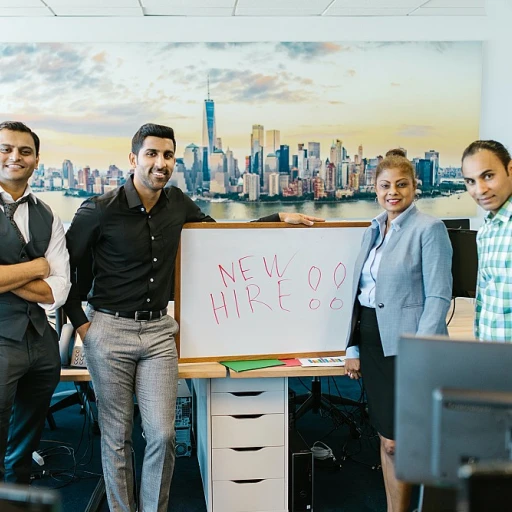The Role of CHROs in Leadership Development
The Key Role CHROs Play in Shaping Leadership
In today's rapidly evolving business landscape, the role of Chief Human Resources Officers (CHROs) has expanded beyond traditional HR functions. They are now central figures in orchestrating leadership development strategies that align with the overall strategic goals of an organization. A successful leadership development program doesn't just materialize overnight; it requires the foresight, planning, and influence that only a seasoned CHRO can provide.
CHROs are tasked with the challenging but crucial responsibility of identifying and nurturing potential leaders within the organization. This involves a deep understanding of the company's culture, values, and strategic direction. By fostering a pipeline of capable leaders, CHROs ensure that the organization is equipped to handle future challenges and seize growth opportunities, thereby securing its long-term success.
Additionally, CHROs serve as the bridge between leadership aspirations and tangible outcomes. By integrating contemporary leadership theories with hands-on experience, CHROs create a learning ecosystem that promotes continuous growth and development for potential leaders. This mentoring side of their role is vital in enhancing both individual competencies and collective organizational capability.
An effective CHRO doesn't just focus on "who" should lead next, but "how" they can develop the necessary skills and decision-making prowess. Leadership is not a one-size-fits-all approach; therefore, CHROs must tailor development programs that address the unique strengths and weaknesses of individuals.
The strategic insight that CHROs bring to leadership development is invaluable. For those aspiring to elevate their leadership impact, mastering the skills as a chief human resources officer is essential.
Mastering leadership as a chief human resources officer is a resource that offers deeper insights into the strategies and skills required.
As we explore further, it's crucial to understand that creating effective leadership programs goes hand in hand with strategic talent management, ultimately crafting a sustainable pathway for organizational success and resilience.
Creating Effective Leadership Development Programs
Designing Tailored Leadership Experiences
To truly transform leadership development, it is crucial for Chief Human Resources Officers (CHROs) to create programs that speak directly to the unique needs and challenges of their organization. Customization is key in developing leaders who are not only effective but also deeply aligned with company values and strategic goals. By conducting thorough needs assessments, CHROs can identify the specific skill gaps and potential areas for growth among their leaders.
Interactive Learning and Real-World Application
An effective leadership development program goes beyond traditional classroom settings and taps into interactive learning methodologies. Incorporating elements such as workshops, simulations, and mentoring can bridge the gap between theory and practice, providing leaders with the tools to navigate complex real-world scenarios.
CHROs should also emphasize experiential learning opportunities through rotational assignments or project-based learning, allowing leaders to apply their skills in various contexts. This not only reinforces their learning experience but also contributes to a more versatile leadership team.
Leveraging Technology for Leadership Growth
In today’s digital age, technology plays a pivotal role in leadership development. CHROs must harness digital tools and platforms to offer leaders flexibility and continuous learning opportunities. Online courses, webinars, and virtual coaching sessions provide leaders access to cutting-edge insights and training, regardless of their geographic location.
Moreover, gamification elements can make the learning process engaging and dynamic. By turning training into a game-like experience, leaders are more likely to remain committed to their development journey.
For more insights on how to elevate your organization's leadership,
mastering leadership as a chief human resources officer can provide further guidance on strategic approaches.
Integrating these various strategies into a comprehensive leadership development program ensures that organizations not only meet their immediate talent needs but also prepare for future challenges, setting a foundation for long-term success.
Strategic Talent Management for Long-term Success
Integrating Strategic Talent Management
Strategic talent management plays a crucial role in the success of leadership development programs, much like the efforts detailed in our previous discussions about creating effective learning environments. Chief Human Resources Officers (CHROs) are uniquely positioned to spearhead initiatives that align leadership programs with the long-term goals of the organization. In this part, we explore how CHROs can effectively manage talent with a strategic lens, ensuring sustainable leadership growth.
One of the first steps in strategic talent management is identifying and fostering potential leaders early on. This involves creating a robust talent pipeline where individuals are groomed with the necessary skills and experiences to prepare them for future leadership roles. CHROs can utilize data-driven approaches to evaluate current talent pools, assess potential, and identify key areas for development. This proactive approach not only benefits the individual employees but also fortifies the organization's leadership foundation.
Moreover, CHROs must ensure that leadership development initiatives are closely tied to the company’s strategic objectives. This connection ensures that the skills and capabilities being developed are those needed for the organization’s future success. By integrating leadership development with broader strategic goals, CHROs ensure the leaders of tomorrow are ready for the challenges of the dynamic business landscape.
Additionally, the role of the CHRO in managing change includes fostering a culture of continuous learning and adaptability. This cultural shift is necessary for effective talent management as it promotes an environment where future leaders are encouraged to evolve along with the organization. By leveraging strategic management practices, CHROs can implement leadership initiatives that are responsive to market shifts and organizational changes.
For more insights into the practical application of these principles, consider examining how CHROs can lead successful change initiatives
here.
Leadership Skills and Decision Making
Enhancing Leadership Skills in a Dynamic Corporate Environment
Developing leadership skills is more important than ever as corporate landscapes rapidly evolve. As CHROs spearhead leadership development initiatives, understanding the multidimensional aspects of leadership skills is crucial. These skills do not merely hinge on managing teams or projects but extend to influencing an organization's direction and driving positive outcomes.
In an earlier section, we explored the significance of effective leadership development programs in cultivating future-ready leaders. Key to these programs is a thorough understanding of the essential skills that today's leaders must possess. Skills such as emotional intelligence, agile problem-solving, and adaptability are increasingly becoming top priorities.
CHROs play a vital role in fostering these skills by incorporating them into tailored programs and regular workshops. They recognize that developing strong decision-making capabilities is critical for any leader. In an unpredictable business environment, the ability to make informed, data-driven decisions can set successful leaders apart from the rest.
Moreover, decision-making is no longer a solitary exercise but often requires collaborative input. CHROs must cultivate environments that encourage shared leadership and diverse perspectives. This collaborative approach not only enhances decision-making quality but also aligns with strategic talent management, which we delved into earlier. By ensuring leaders are fully equipped with these competencies, organizations can achieve long-term success and resilience.
Ultimately, the transformative power of CHRO-led initiatives lies in their ability to seamlessly integrate leadership development with overall business strategies. By focusing on enhancing the skills that drive decision making, CHROs ensure leaders are well-prepared to navigate the complexities of modern business challenges.
Case Studies: Successful Leadership Development Initiatives
Real-World Examples of Effective Leadership Development
Examining successful leadership development initiatives provides invaluable insights for CHROs aspiring to elevate their organizations’ growth trajectories. One notable example heralds from a multinational company where the CHRO spearheaded a transformational leadership program, aiming to align leaders with the company’s overarching strategic goals. This initiative highlighted the alignment discussed earlier, illustrating how a carefully devised leadership development program supports organizational objectives by nurturing leaders who embody the company’s vision and values.
In another poignant case, a tech company utilized data-driven approaches to identify high-potential talent. By leveraging precise metrics and analytics, they curated personalized development paths that not only honed leadership skills but also strengthened decision-making capabilities—a critical aspect previously emphasized. This approach resulted in heightened employee engagement and retention, proving that strategic talent management significantly contributes to long-term success.
A prominent healthcare organization opted for experiential learning methods to cultivate future leaders, drawing on the value of hands-on experiences. By creating opportunities for aspiring leaders to undertake real-world challenges within the safety of a guided environment, they were able to enhance decision-making skills considerably, equipping leaders to navigate complex scenarios efficiently.
As the landscape of leadership development continues to evolve, these case studies illuminate essential strategies and innovative practices that can serve as benchmarks for other CHROs aiming to foster a culture of excellence and adaptability within their workforce.
The Future of Leadership Development in Human Resources
Adapting to Change in Leadership Development
As the world continues to evolve at a rapid pace, the landscape of leadership development within human resources is also undergoing significant transformation. The role of CHROs (Chief Human Resources Officers) is pivotal, as they must spearhead efforts to modernize and future-proof leadership development programs.
One aspect that is gaining momentum is the integration of technology in leadership training. With advancements in AI and machine learning, data-driven insights are vital to identify future leaders and tailor development programs to individual needs. CHROs need to ensure these technologies are leveraged to empower decision-making processes, as outlined in previous discussions on leadership skills and decision making.
Looking ahead, the challenges and opportunities associated with leadership development will require CHROs to be agile and adaptable. Strategic talent management is key to success, as it not only aligns with immediate organizational goals but also sets a foundation for sustainable long-term growth. As emphasized in our discussion on strategic talent management for long-term success, it is crucial to blend traditional methods with innovative approaches to remain competitive.
In conclusion, the future of leadership development lies in a dynamic approach that balances technological advancements with human-centric strategies. CHROs who embrace change and continuously evolve their practices will be best positioned to shape effective leaders and drive organizational success in the years to come.








